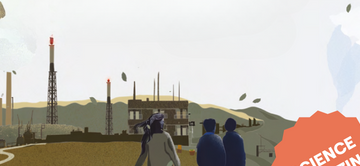On August 28th, Nicolas Hulot, the French Minister for Ecological and Solidary Transition, stepped down. One alleged reason for his decision was the attendance of a hunt lobbyist at an official meeting held at the Elysée Palace. The presence of lobby groups within President’s inner circle is a democratic issue for the former minister. Are lobbies detrimental to public decision-making?
Did you say lobbyist?
Lobbies are pressure groups that defend the specific or general interests of stakeholders in public decisions – these may be industry groups as well as investors and associations. The European Union has a list of 11,000 lobbyists in Brussels, which includes industry trade associations (e.g. the French Union of Chemical Industries), trade unions (e.g. Force Ouvrière) and NGOs (e.g. WWF France).[1] The term has an anti-democratic overtone because it refers to the corridors of power: the “hall”, or lobby, in Parliament is where plots are devised between lobbyists and politicians, away from the media and public’s gaze. Yet this is only one of their tasks, which, by contrast, may even improve democratic decision-making.
Lobbyists as Actors in Public Debates
For example, the ‘Comité pour une Economie Verte’ (CEV), which is part of France’s Minister for Ecological and Solidary Transition, relies on many lobbyists to provide opinions on environmental policy issues.[2] The aim is to involve all stakeholders into the public decision. Agricultural unions and agro-chemical manufacturers worked alongside consumer and environmental protection associations in the task force reviewing pesticide regulations. In their discussions they exchanged important information about the decisions to be made. A summary report of these discussions was published on the Committee’s website as a public notice, an appraisal and as recommendations.
Lobby groups also relay scientific information about complex subjects, such as the impact of pollution on health, climate change and biodiversity conservation. Of course, as stakeholder representatives, lobbies tend to highlight or exaggerate studies that support their own interests. This was seen in the controversy over glyphosate and GM maize crops, which put Monsanto-Bayer and FNSEA (French farmers’ union federation) on one side and environmental defence associations on the other. However, bias is not as much of an issue when interests are clearly defined. After all, juries listen to both the defendants and plaintiffs before coming to a verdict. Each side puts its case forward in line with its own mandate. If the mandate is clear, comparing insightful arguments should not pose any danger to its outcome, because the decision makers have not been misled. [3]
Lobbyists' Misdemeanours
Inequality between lobby groups is the real issue. The imbalance is primarily due to the financial means and human resources available to lobby groups – meaning large industry groups are much more powerful than NGOs. This results in a waste of resources. This is particularly noticeable in the United States where lobby groups must publish their activities, including actual and pledged financial amounts. According to a study by Karam Kang (Carnegie Mellon University), businesses in the energy sector spent more than $600 million on lobbying activities in 2007–2008, on average $1 million per company or producer union. The study goes on to show the impact on public policy for every dollar invested: at least $3 million is required to improve the probability of a favourable outcome by just 1.2%! [4]Nevertheless, it still seems worthwhile because the financial gains are significant (on average, $500 million per decision), meaning the average return on lobbying expenditure is estimated at between 137 and 152%.[5]
Making Good Use of Lobby Groups
Whether we like it or not, lobbyists are part of political life. We may lament the fact that they interfere with public debate because of their access to the highest echelons of power. Yet they are able to raise awareness and mobilise the public. The art of politics is all about working with lobbyists’ conflicting opinions rather than giving in to one side or the other, or even establishing new pressure groups. This is just one of the effects, and is now one of the drivers, of renewable energy policies over the last twenty years. Credit should be given to the environmentalist NGOs' lobbying campaigns, and specifically to the organisation created by Nicolas Hulot[6], for the shift in recent decades in environmental and energy policies by the French government and industrial giants. And subsidy policies for renewable energies have led to the emergence of solar panel and wind turbine lobbyists who continue to call for even more ambitious support to renewables.
To lobby or not to lobby? That is not the question.
[1] See the ‘Transparency’ website from the European Union: https://ec.europa.eu/info/about-european-commission/service-standards-an...
[3] This ideas has been modeled in economics by Mathias Dewatripont and Jean Tirole in « Advocates » Journal of Political Economy (1999) 107(1) :1-39.
[4] The default option in the computation is the absence of lobby groups.
[5] Kang, K., Policy Influence and Private Returns from Lobbying in the Energy Sector, Review of Economic Studies (2016) 83, 269–305





